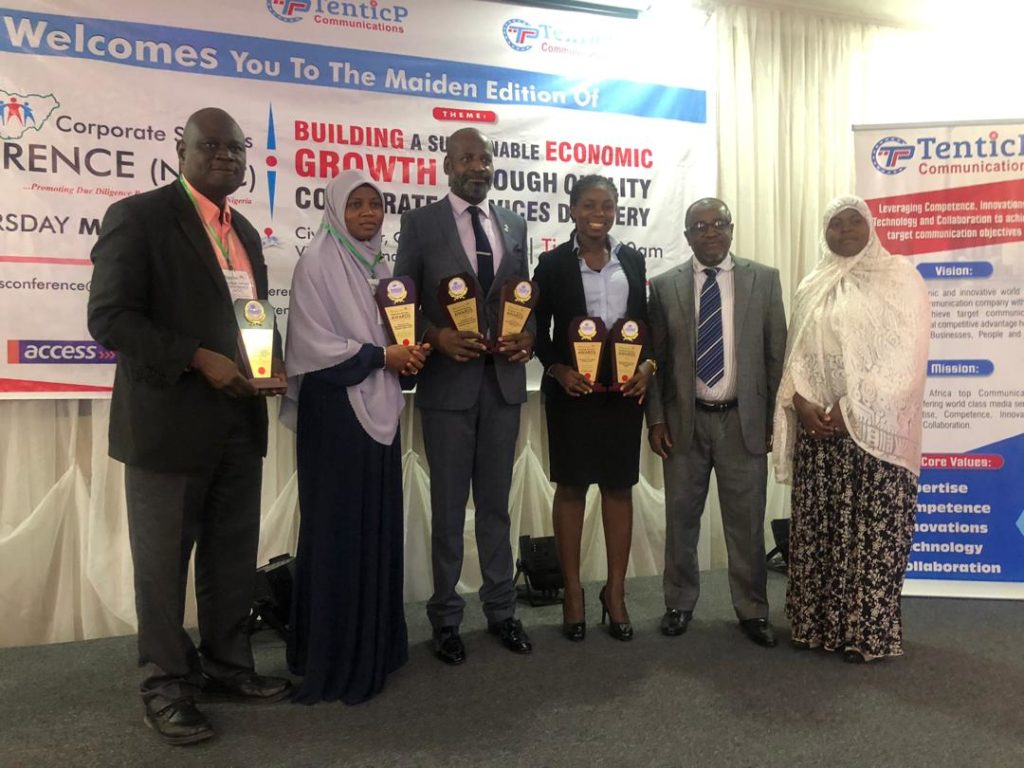There is need for reorientation Nigeria’s current values system in the private and public business sectors to ensure speedy growth of the economy
That was the consensus reached by experts at the maiden edition of the Nigeria Corporate Services Conference organised by TenticP communications which held in Lagos on Thursday 2nd of May 2019.
Lead speaker,, Muda Yusuf, director general, Lagos Chamber of Commerce and Industry (LCCI), in his paper titled “Building a sustainable economic growth through corporate services delivery” said it was time to walk the talk, as writing down ethics and code of conducts on pieces of paper would not necessarily translate into delivery of quality services.

L-R: Managing Director/ Lead Strategist, TenticP Communications, Nahimah Ajilanle-Nurudeen, Abolade O. Kehinde CTA, Deputy DirectorCompany, representative of the Executive Chairman, Federal Inland Revenue Service (FIRS), Mr. Babatunde Fowler, receiving Corporate Services Most Outstanding Revenue Generating Agency and Corporate Services Most Outstanding CEO in Public Sector Awards from the Chief Executive Officer, COO Academy Halogen, Dr. Adewale Adeagbo at the maiden edition of the Nigeria Corporate Services Conference, NCSC 2019 held on Thursday May 2nd at the Civic Centre, Victoria Island, Lagos
“It is imperative for us to act in a responsible manner in accordance with all relevant laws, regulations, guidelines and industry standards.
“If we all commit to standard practices and procedures, we will definitely be able to raise the bar of services delivery to drive the sustainable growth of the Nigeria economy.
“We must commit to abiding by established rules, regulations and codes of conduct in our corporate and public endeavours; we must make doing things right our national priority. We need to change our mind-set from the entitlement-based to a service focus,” Yusuf said.
Yusuf said that professionalism in the public and corporate world should be promoted and deterrent sanctions should be given to unethical and unprofessional conduct.
“We all know that in Nigeria, those who do the right things suffer the most. The ones paying duties at the ports are the ones that will face the most headaches with customs and running an ethical business in this country can be very challenging. This is especially as we have a very weak judicial system and seeking redress can be exhausting,” he said.
Babatunde Fowler, chairman, Federal Inland Revenue Services (FIRS) said that automation and technology in tax payment systems is helping Nigeria build sustainable economic growth.
“Things like the e-receipts, e-tax clearance certificates and the automated VAT collection that we want to do in key sectors will help build sustainable economic growth. Already, states like Lagos, Kano, Edo, Kaduna and Akwa-Ibom are doing very well business wise because of internally generated revenue from tax proceeds and we can see how well businesses are doing in those states in the ease of doing business ranking,” Fowler said.
He said although Nigeria has a low tax-to-GDP ratio, as the International Monetary Fund (IMF) states that a 15 percent minimum threshold is associated with significant acceleration of growth and development, while Nigeria is currently at nine percent, the country working towards achieving double figures in tax-to-GDP ratio in the near future.
According to Isa Ali Pantami, director general, National Information Technology Development Agency (NITDA), who was represented by Jimoh Falilat Olaitan during the panel session, the government agency was focused on using ICT which is a major contributor to Nigeria’s GDP, to ensure sustainable economic growth.
“NITDA developed a strategic roadmap for the IT sector that is aimed at transforming Nigeria into a knowledge-based society. The seven key pillars of our roadmap are IT regulation, capacity building, digital inclusion, digital job creation, government digital service promotion, local content development and promotion and cyber security. With investment and concentration in these areas, especially at a time when there is digital revolution, the country is bound to see sustainable economic growth,” he said.
“We need a total re-orientation of our value system in Nigeria. We place value on the most irrelevant things right now, but the moment we start to focus on the more important things, we will definitely see a steady growing economy,” Afolabi Sofola, chairman, Kosofe Local Government said.
In her welcome address, organizer of the event Nahimah Ajikanle-Nurudeen
Managing Director/Lead Strategist of TenticP Communications Nigeria Limited advice the Federal Government on the need to ensure strict compliance to SERVICOM policy by all Ministries, Departments and Agencies (MDAs) in Nigeria.










